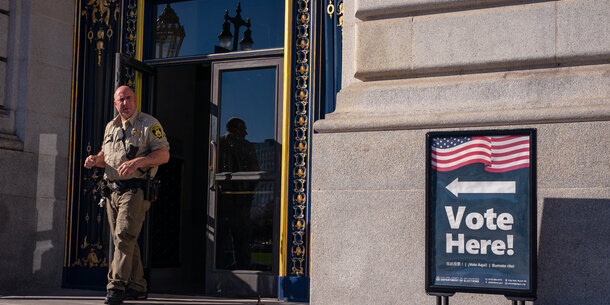Since Thursday, the bipartisan Federal Election Commission hasn’t been able do its job. That’s because the independent agency, which oversees money in campaigns for federal office, no longer has the minimum four required members to do most business.
The loss of quorum is due to the resignation of a Republican appointee, coupled with President Trump’s unprecedented move in February to fire a Democratic appointee. Such a shortfall has only happened three other times in the FEC’s 50-year history, including twice during Trump’s first term.
Ordinarily, the big question would be how fast the president and Congress will move to restore a full complement of commissioners so the agency can function. That is still important. But in light of the firing and the president’s other steps to exert control over the FEC and other independent agencies, there is now a much bigger issue: Will the FEC be able to continue as an independent watchdog at all? Because even worse than a dormant FEC is one that could be weaponized against the president’s opponents.
The FEC was created as part of the post-Watergate reforms that established our current system of campaign contribution limits and disclosure requirements. It is led by six commissioners, no more than three of whom can be from one party. When fewer than four seats are filled, the commission cannot carry out most of its important functions, including enforcing the law and issuing regulations and other legal guidance.
Thanks in part to its evenly divided leadership, the FEC is nobody’s idea of an aggressive watchdog, often deadlocking on partisan lines in important matters. That gridlock has exacerbated the effects of Supreme Court decisions like Citizens United, for instance, by making it easier for candidates to outsource key campaign operations to super PACs that can raise unlimited amounts of money.
But even a dysfunctional FEC is still important. Among other things, the agency plays a vital role in collecting and disseminating campaign finance data, which is critical at a time when Trump and his Democratic opponents continue raising money at a rapid clip ahead of the 2026 midterms (and when a number of the president’s biggest donors have a hand in shaping policy in his administration).
Loss of the FEC’s quorum won’t keep data from being collected and published, but the commission won’t be able to do anything to enforce reporting requirements against those who ignore them. It also can’t address novel legal issues that arise — for instance, in connection to online campaign activity, where significant reporting gaps remain.
But the loss of the FEC’s quorum may not even be the agency’s biggest challenge. In February, the president fired a sitting Democratic appointee, Ellen Weintraub (full disclosure: I worked for Weintraub from 2011 to 2014). This firing is the reason the FEC was down to only four commissioners before the latest resignation.
To be sure, Weintraub’s term at the commission had long expired and she was eligible to be replaced. But no president has ever removed an FEC commissioner from the opposing party without naming a replacement, usually selected by the opposition party’s congressional leaders. Her removal was part of a series of firings of Democratic commissioners at independent agencies who are supposed to be legally insulated from presidential removal — representing a major power grab by the White House.
Several weeks later, the White House issued an executive order purporting to formally place all independent executive branch agencies under direct presidential control. The president subsequently issued an order that, among other things, directs the Election Assistance Commission — another federal agency that was modeled in key respects on the FEC — to illegally revise federal voter registration procedures. A federal court has blocked relevant parts of the order in a Brennan Center lawsuit challenging the move while the case proceeds.
The president’s assault on the independence of agencies like the Elections Assistance Commission and FEC flies in the face of Article I of the Constitution, which vests oversight over federal elections in the states and Congress. Congress in turn delegated oversight over federal campaign finance rules to the independent FEC with the goal — as we recently noted in a publicly filed comment to the agency — of ensuring that election-related complaints and questions would be handled free from partisan manipulation.
The record-breaking 2024 election showed the dire need for effective and scrupulously even-handed campaign finance regulation. At a bare minimum, the president and Congress should follow the practices of every president since the 1970s for filling opposing party seats on the commission. Nominees from both parties should also be asked whether they will explicitly commit to defending the FEC’s independence.
Ultimately, as frustrating as some of the FEC’s current failings are, the solution can never be to allow the agency to be weaponized for partisan ends. There has long been broad, bipartisan agreement on this point — and it’s more important than ever to reaffirm this commitment to fairness.



